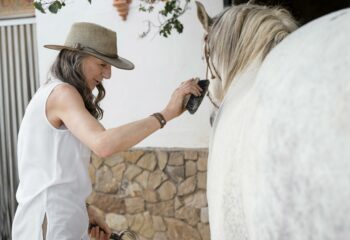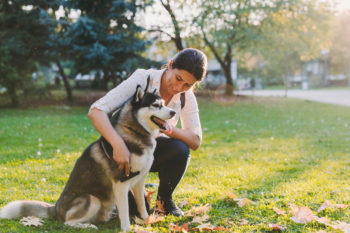If your dream job involves playing and caring for dogs, then becoming a dog sitter is probably one of the perfect careers for you.
No specific professional qualifications are required to work as a dog sitter. Your work should be based, first of all, on the boundless passion for dogs and for life with them. & Nbsp;
ARE YOU LOOKING FOR A DOG SITTER?
Although love for dogs is the fundamental condition, it is not enough to become a dog sitter: doing this job also requires several other skills and requirements, and in this complete guide we cover them all!
Guide to becoming a dog sitter: where to start?
The first step to becoming a professional dog sitter is to understand every aspect and responsibility of the job. & nbsp;
So let’s start with an overview of the duties and responsibilities of those who work as a dog sitter; we will then see what specific skills are required, how to organize the work and what the salary prospects are.
Dog sitters: what do they do?
Those who work as a dog sitter take care of the dogs of people who, for various reasons, cannot temporarily take care of them. People who have a dog may need a dog sitting service when they leave on vacation, when they are at work or, in general, if they need to be away from home for long or short periods of time. & Nbsp;
Depending on the situation, dog owners may ask you to host the dog in your home, take care of it at their home or pick it up and walk it one or more times a day.
The responsibilities of a dog sitter may include:
- Feed the dog and make sure he always has fresh water.
- Brush and keep the dog clean or take him for grooming.
- Clean his dog bed or cushions on which he sleeps.
- Walk the dog and respect the owner’s requests for it (some dogs need long or particularly intense walks).
- Vacuum the hair of the dog around the house.
- Give medications, in case the dog is on treatment.
- Take the dog to the vet in case of emergency.
- Notify owners of any injury or illness and keep them updated on their dogs even through photos or videos. & nbsp;
- Carefully follow city laws and regulations, such as keeping dogs on a leash in urban areas, put muzzle them on public transport or pick up their excrement.
Skills and requirements to become a dog sitter
As we said at the beginning, love for dogs is the essential condition. It seems trivial to say, but for the avoidance of doubt we do not recommend working closely with dogs if you are afraid of them or do not like the idea of dealing with hair and collecting their excrement on the street. 😉
That said, the skills and requirements that are important to doing the dog sitter job well include:
- Reliability , why take care of the dog another person is a considerable responsibility.
- Having excellent communication skills, not only with dogs but also with the humans who entrust them to you.
- Empathy , to get in tune with the dog you will take care of .
- Great attention to detail and cleanliness .
- Being physically fit , because there is no more exercise fun than running after a dog that wants to play!
- Be patient , because dogs sometimes know how to test it.
- Love the I work outdoors , and in any weather (yes, dogs have to go out several times a day even if it rains or snows).
- Have good organisation skills and practical sense.
If you want to become a professional dog sitter and gain even more skills to be successful in the profession, we also recommend these options:
Take a first aid course for animals. Learn about canine training. Take a professional training / dog sitting course.
Hours, working conditions and other precautions
Becoming a dog sitter also means accepting working hours that are not always fixed or “comfortable”. If you feel you want a professional life marked by 9 am-6pm Monday to Friday, working as a dog sitter may not be for you.
One of the biggest advantages of the dog sitter profession is flexibility and in general, if you work as a freelancer, you can set your own hours. If, on the other hand, you find work as a dog sitter in a company that offers pet sitting services, the organization may be different and more rigid.
To consider: physical activity and organisation
Dog sitting is a physically demanding job : you will have to walk the dogs one or more times a day, and sometimes for long distances.
Depending on the owners’ needs, you may having to go to their house to get the dog and take him out. In that case, it is important to immediately establish the organisation of the outings: how will the house keys be delivered to you? Are there any rules to follow to access the building or home? In which areas of the house is the dog located and which ones can you access? Do you also have to look after him while he is at home, or only during walks? There are many questions you will need to ask owners to make sure you have all the information you need to take the job.
Whatever the agreements between you and the owner, we recommend that you always put them in writing : clear agreements, long friendship!
Emergency management
While you always hope it won’t happen, you may find yourself handling emergencies during your dog sitter job if the dog under your supervision becomes ill or injured and needs veterinary care.
For this, it is of the utmost importance that, when establishing your working conditions, you ask the owners to fill in a detailed form with their contact details , those of the veterinary clinic and all relevant information about the animal (including age, breed, previous medical conditions, allergies and dietary regulations, etc.). These emergencies can, in extreme and very unfortunate cases, lead to the death of the animal.
Remember that, in any case, it is not up to you to make decisions about the health of the dog you are entrusted with: always, always, always contact (did we mention that already?) the owners before making decisions that have to do with drugs or medical interventions, even if recommended by the veterinarian.
Work safely
Finally, don’t forget that working as a dog sitter also involves a certain personal risk: despite your passion and in-depth knowledge of the canine world, an instinctive or aggressive dog reaction can always happen and create you. some problems. Cuts, small wounds or sometimes bites (even just for fun) are the order of the day when taking care of a dog, especially if very lively: remember to also think about your health and always act in maximum safety.
If you decide to make dog sitting your main profession, taking out insurance is a great idea: it will cover things like property damage, loss or theft of keys, and damage to the dog. & nbsp;
The good news? When you join Jopla, we’ll take care of insurance ! We offer you 2 essential insurance solutions to allow you to work in complete safety. 💚
How much does a dog sitter make?
If you work as a freelance dog sitter you can set your own rates. Generally, the hourly rate of a dog sitter ranges from 10 to 25 euros per hour , but it can be even higher. A year, the salary of those who work as a full-time dog sitter can reach 15-20,000 euros.
The range of rates you can ask for depends first of all on the area you live in: in a big city you will find more competition but also much more demand, and vice versa in a small town. & nbsp;
You can also afford to increase the rate if your dog sitting service includes special conditions – such as taking care of the dog at your home, on holidays or during the night.
If you decide to offer your services through an online pet sitting platform, please note that you may be charged a fee that typically varies between 10% and 20%.
Opening a profile on Jopla , however, everything you earn remains with you: we do not charge any commission!


